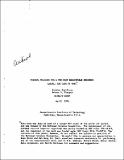Pricing policies for a two-part exhaustible resource cartel: The case of OPEC
Author(s)
Hnyilicza, Esteban; Pindyck, Robert S.
DownloadMIT-EL-76-008WP-04296435.pdf (1.216Mb)
Metadata
Show full item recordAbstract
This paper examines pricing policies for OPEC under the assumption that
the cartel is composed of a block of spender countries with large cash
needs and a block of saver countries with little immediate need for cash
and a lower rate of discount. The decision problem for the two-part cartel
is embodied in a game-theoretic framework and the optimal bargaining solution
is computed using results from the theory of cooperative games developed by
Nash. The set of feasible bargaining points -- and the corresponding Nash
solution -- is computed under two assumptions on the behavior of output shares:
that they are subject to choice and that they are fixed at historical values.
Our results suggest that for fixed output shares, there is little room for
bargaining and the price path approximates the optimal monopoly price path.
If the shares are subject to control, optimal paths depend significantly on
the relative bargaining power of each block.
Description
Prepared in association with the Sloan School of Management and the Dept. of Economics
Date issued
1976Publisher
MIT Energy Lab
Other identifiers
04296435
Series/Report no.
MIT-EL76-008WP
Keywords
Petroleum products -- Prices, Organization of Petroleum Exporting Countries
Collections
The following license files are associated with this item: